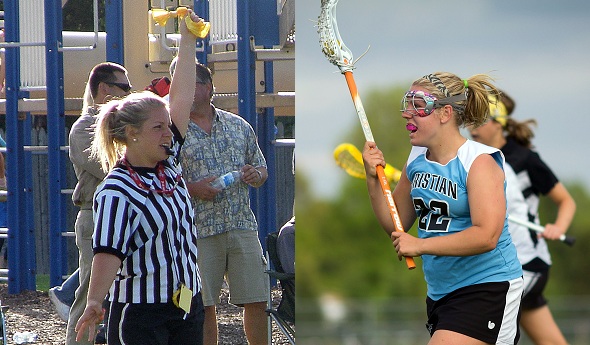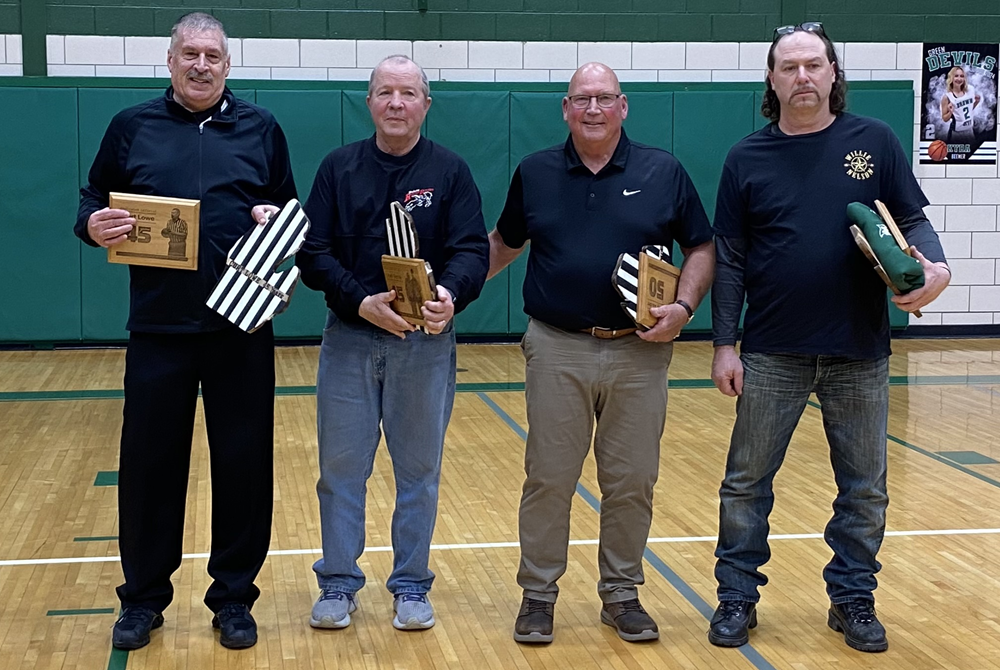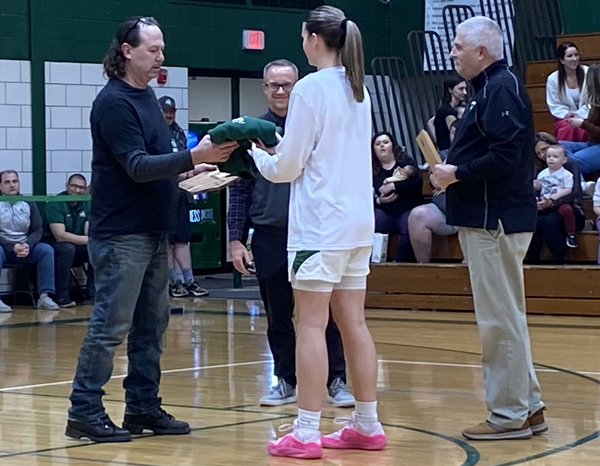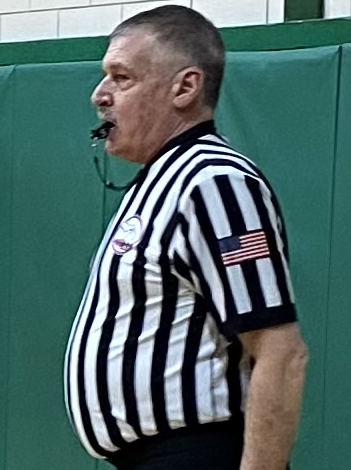
Legacy Program Serves New Officials
By
Rob Kaminski
MHSAA benchmarks editor
October 5, 2012
Implemented 20 years ago by the MHSAA, the Legacy Student Officials Program continues to spawn enthusiastic young officials who are more likely to stay in the family beyond their formative years.
The program pairs high school juniors or seniors with mentors who are already registered MHSAA officials. The one-on-one tutelage serves to introduce, educate and encourage interested students, while upping the odds for retention. Both parties sign a Legacy Pledge form outlining the basic agreement, with one condition being that the students work only subvarsity contests with their mentor or other veteran MHSAA officials.
During the 2011-12 school year, 107 students participated as Legacy officials, bringing the total to 1,156 since 1992. It’s another example of the officiating lineage growing from within and taking care of its own. In many cases, the vets literally are family.
“After graduating high school in the spring of 2006, my father, Rick (an MHSAA registered official for more than 25 years), inspired me to register and work the football season the next fall,” said Chris “C.J.” Jackson. “The worst years of officiating for me were my first two seasons because I couldn’t stand the berating from coaches and fans. I wasn’t good, and everyone picked up on that. My Dad was the only person who kept me in the game. Six seasons later, I find myself going into my second season of college football working as a deep wing official for the Great Lakes Intercollegiate Athletics Conference (GLIAC). This achievement can only be attributed to my dad.”
Also following in Dad’s footsteps are Trevor and Austin Hartley of Lansing, as father, Eric, got them involved at an early age.
“He has helped me on the field, but more importantly off of the field to become a better official in general and a better person,” said Trevor of Eric. “He was responsible for getting me into officiating, but staying in has been a goal from the beginning.”
Trevor’s sentiment is common among the species. Once officiating gets into the bloodstream – whether from immediate family or from a mentor in the extended family – it tends to stay.
Mentors in the Legacy Program take their roles seriously, and spend countless unpaid hours helping their students develop. The finished product is all the compensation they need.
“If it weren’t for my mentor pushing me and telling me I could be a really great official, I never would have kept going this far. I continue to officiate because it is a great opportunity to give back and be a part of something I love with a passion, and that is sports,” said Detroit Martin Luther King grad Kyle Bowen, who first registered in 2008 under the guidance of Detroit’s Darryl Jones.
The basketball official has taken his skills to Grand Rapids, where he attends Grand Valley State University and continues work as an official while discovering its ancillary benefits.
“Being an official has helped me so much in a lot of different aspects in my life,” Bowen said. “I work at Grand Valley as a supervisor in the intramural program. That job entails developing and training new officials so we can produce quality officiating in our program.
 “Darryl showed me how important it is to have tough skin and how to handle adverse situations when they come up and not let them linger. He taught me that officiating is probably one of the best things you could ever do, but it’s not for everyone.”
“Darryl showed me how important it is to have tough skin and how to handle adverse situations when they come up and not let them linger. He taught me that officiating is probably one of the best things you could ever do, but it’s not for everyone.”
Not for everyone, but thanks to a growing list of sports, there are more opportunities to lure potential candidates. When the Legacy Program was launched, competitive cheer and lacrosse were not yet MHSAA-sponsored sports. Cheer hit the tournament scene in 1994, while lacrosse arrived in 2005. As participation in those sports continues to increase, the pool of potential officials expands.
For recent Oakland University graduate Leah DiCristofaro, cheerleading was something she’d enjoyed since the age of 5. Her mother Renee is a veteran official for the Michigan Cheer Judges Association, where Candy Cox also serves as one of the state’s top judges.
“When Leah was a senior in high school (St. Clair Shores Lake Shore), she registered as a Legacy official,” Cox said. “She had a mentor who was with her at every competition during that year. At her first competition, she worried that she would miss something and not credit the teams properly. But, with guidance from her mentor and fellow judges those fears were short-lived.”
DiCristofaro continued to judge during college, but on a limited basis. The fact she took on any assignments at all illustrated her commitment, as she not only was putting up grades worthy of making the national honor roll, but she was a four-year starter for the Grizzlies softball team. As a catcher and designated player, DiCristofaro led the team with a .308 batting average as a sophomore, and tied for the team lead with six homers as a senior last spring.
“She accepted a limited amount of meets, but she kept officiating throughout all four years of college. Last year she filled in several times for officials who cancelled at the last minute,” Cox said.
Across the state, Helen Young experienced a similar childhood centered around athletics. Her parents, Neal and Vicki, coach lacrosse for Grand Rapids Christian schools. Vicki oversees the youth program, 3rd through 12th grades, and coaches the middle school. Neal is the varsity head coach at Christian High School, where Helen excelled and earned numerous honors.
Through her experiences, she also began to help her mother coach the middle school team, and made acquaintances like Nancy Lapekas of the West Michigan Lacrosse Association. Young was hooked.
“Nancy Lapekas has been so helpful in teaching me, assigning me, and supporting me on and off the lacrosse field,” said Young, who last spring earned a $1,000 scholarship from Michigan Lacrosse. “She has kept me going. As a young ref, if she didn't have my back I don't think I would have been able to continue. I love all aspects of the sport. I play, coach, and officiate, and it is nice to see the game from all angles.”
Young is a freshman at Michigan State University, and already plans to have a busy spring, when she’ll be balancing classwork and officiating.
“The most rewarding part of being a younger official is that I get to meet and ref with wonderful role models,” she said. “Some of the greatest people are adults I get to work with on the field. The cool part about my relationship with these other refs is that they are there for me off the field as well.”
That’s the beauty of the Legacy Program. A dedicated mentor sets the wheels in motion and opens a world of possibilities to students dedicated enough to seek advancement. There are no limits to the number of contacts and support groups in the industry.
Luke Bowman is a 2008 Jackson Lumen Christi grad who still leans on mentor Chuck Walters from time to time.
“Chuck has been a huge influence in my officiating career. I am always able to give him a call to bounce rule questions off of, even after I left my hometown being 100 miles away up at Central Michigan University.”
Like all young officials, Bowman soon realized that there were more people like Walters wherever he went; an endless supply of support personnel the further one delves into this avocation.
“The Capital Area Officials Association in Lansing has helped me grow as an official by constantly challenging my skills and abilities,” Bowman said. “Each meeting begins with a closed-book rules quiz to test our knowledge. Why is it closed-book? On Friday nights we can’t bust out the rules book on the field. The tools and resources available to the members range from evaluations at games and scrimmages to working with veteran officials.”
 A couple common threads bond Legacy officials who continue to register with the MHSAA. Many are college-bound, or first officiated at the youth level.
A couple common threads bond Legacy officials who continue to register with the MHSAA. Many are college-bound, or first officiated at the youth level.
Michael Reseigh fits the bill. While playing soccer at Rochester High School, Reseigh officiated local club games for five years. When his playing days were done he set his sights on officiating the high school level and contacted Pat Hayes of the Soccer Referees Association in the spring of 2009.
Now a senior at the University of Michigan, he has been at it ever since, with help from Hayes.
“When I went to college, my availability became limited. I was almost completely unavailable for the boys season in the fall. I was available, however, for the girls season since my semester at college finished at the end of April. I expressed my desire to Pat Hayes that I remain active in the association despite my limited availability. She has been great to me, giving me as many games as possible for the month of May when I come home,” Reseigh said.
Of course, not all in the world of fun and games is, well, fun and games. Young officials will experience all of the pitfalls that come with the uniform; tense moments, nervousness, missed calls and clashes with coaches.
They also have the additional burden of learning mechanics, contest rules and philosophies while working the lowest levels where the most chaotic action and least sympathetic coaches preside. Then, there’s the final hurdle of perception, simply brought on by their youthful appearance. It’s been said by many a veteran official that the least experienced officials have the toughest games to work.
“Some of the challenges I have had are due to my age,” Young said. “I think coaches don't take me seriously, and expect I don't know what I am talking about. If I let it bother me, then I probably wouldn't be able to ref. One time I made a call, and the coach proceeded to scream at me and yell at me and come onto the field. The behavior was even more ridiculous because it was a 5th/6th-grade game! I think that he felt like he could yell at me because I was a young ref.”
Trevor Hartley relates a similar scenario.
“I have had to deal with it since Day One,” Hartley said. “In my first-ever football game, a youth game, a coach was arguing a no-call with me and questioned if I was any older than the 5th and 6th-grade players on the field.”
The participants at that level are far from perfect. Having people understand that is one of the luxuries youth players have and officials don’t. It’sone of the great double-standards of athletics.
“A first-year official doing a 5th-grade football game is expected by coaches, players and fans to look like, act like, talk like, and officiate like a Big Ten football official,” Jackson said. “Yes, every game is important, no matter the level of play, but it is impossible to expect the greatest officials at every level of play.”
Again, this is where the Legacy Program pays dividends, as the young officials are not left on an island. There is support early and often, all the while allowing officials to grow. For those who understand their role in the game, the benefits stretch beyond the fields and gyms.
“I would tell students who are hesitant to take the step and try officiating, as there is really nothing to lose,” said Reseigh.
“I have learned how to manage any type of situation due to officiating. It has taught me respect for the game and all involved with it as well as taking responsibility for my own actions,” Jackson said.
“To younger people who want to officiate I would say, ‘Go for it,’” said Young. “It is such a great experience and it really helped me mature and be confident.”
“In the heat of the moment, you are going to have to effectively communicate with coaches and players in intense conversations,” Bowman said. “These skills will translate to the workplace as well. I directly attribute my success in the workplace to officiating.”
“The best advice I can give is, ‘Just go out there and try it,’” Bowen said. “No one will be perfect and get every call, but if you put your best effort forward then you can do great things.”
Sounds like they’ve been well trained from those before them, and are more than capable of carrying on the officiating legacy.
PHOTOS: (Top) Helen Young, a girls lacrosse official and product of the Legacy program, called youth lacrosse games while also playing on Grand Rapids Christian's varsity. (Middle) Kyle Bowen is a Legacy program and Detroit Martin Luther King grad.
NOTE: This is the second installment in the series "Making – and Answering – the Call" detailing the careers and service of MHSAA officials. Click the link below to view the first.

Longtime Officials, Statistician Honored for Decades as 'Behind-the-Scenes' Heroes
By
Paul Costanzo
Special for MHSAA.com
February 23, 2024
BROWN CITY – Jerry Sauder thought he was going to be a presenter Thursday night, as his alma mater Brown City was honoring officials Curt Lowe and Joel Venia and school statistician Todd Vandewarker for their decades of service.
 But that was simply a ruse by fellow official Tom Mailloux and Brown City athletic director Tony Burton to get Sauder there to join the ceremony and receive his own award for 50 years as an official.
But that was simply a ruse by fellow official Tom Mailloux and Brown City athletic director Tony Burton to get Sauder there to join the ceremony and receive his own award for 50 years as an official.
With Sauder on the court, 175 total years of involvement with athletics were honored between the JV and varsity Unionville-Sebewaing vs. Brown City girls basketball games. Sauder spent 50 years as an official, Lowe and Venia 45, and Vandewarker has spent 35 years as a statistician, all across multiple sports.
“Tonight, we gather to pay tribute to those whose steadfast dedication has woven the fabric of excellence into the tapestry of Michigan high school athletics,” Brown City principal Brad Hale said to kick off the ceremony. “It is with profound gratitude that we extend our heartfelt appreciation to the unsung heroes behind the scenes – the pillars whose tireless efforts ensure that each game unfolds seamlessly, each moment etched with the spirit of sportsmanship and fair play. … Tonight, we shine a spotlight on a few whose commitment spans decades, illuminating the path for generations of athletes to follow.”
Sauder’s 50 years as an official included 25 as a Division I college basketball referee. He is currently working in an administrative role with Elite Officiating, overseeing officials in the Michigan Intercollegiate Athletic Association, Great Lakes Intercollegiate Athletic Conference and Wolverine-Hoosier Athletic Conference. He’s officiated NCAA Tournament games and contests around the world after getting noticed at a camp at Western Michigan University.
“I’ve always said I’m the luckiest guy to put on a shirt,” he said. “I was fortunate enough to be selected to be given the opportunity. There’s a lot of guys that could have, but weren’t set up to do it at that time.”
During his time as a high school official, Sauder reffed MHSAA Finals for basketball and football. He also spent time officiating baseball and softball games.
He began officiating when his best friend Jim Seidell, a longtime coach and administrator in Brown City, convinced him to start. Sauder knows his path isn’t a common one, and that it’s not easy to convince people to get into officiating. But with perseverance, opportunities are available.
 “There’s a dire need right now,” Sauder said. “We’ve got to do something because if we don’t, high school sports as we know it is going to suffer. … I was fortunate to have good people around me that mentored me. Kids start, they last a couple years and they walk away from it. They don’t pay enough money to get yelled at like people go at you now. I don’t blame the young people.”
“There’s a dire need right now,” Sauder said. “We’ve got to do something because if we don’t, high school sports as we know it is going to suffer. … I was fortunate to have good people around me that mentored me. Kids start, they last a couple years and they walk away from it. They don’t pay enough money to get yelled at like people go at you now. I don’t blame the young people.”
Lowe, who officiated Thursday night’s JV game before the ceremony, got his start thanks to Sauder and Seidell. Also a Brown City graduate, Lowe’s 45 years of officiating include multiple assignments at MHSAA Football and Basketball Finals. He’s also been on the court for women’s college basketball games.
“Officiating is like family,” Lowe said. “I have met so many people – wonderful people. And, over 45 years, it’s been a ton.”
While he’s worked plenty of games in the Thumb, much of Lowe’s time as an official was spent in the Saginaw and Flint area, where he was able to officiate games featuring some of the state’s greatest athletes, including Mateen Cleaves, Draymond Green, Mark Ingram and the late Charles Rogers.
“Those were the best games, and Jerry got me in there,” Lowe said. “That was the best ball ever. It was just amazing to watch.”
Lowe’s crew Thursday night included a pair of younger officials who later officiated the varsity game with Mailloux. Lowe thinks it’s a great opportunity for athletes who want to stay connected to sports.
Venia’s start in officiating was more by happenstance. He was working the scoreboard for rec basketball games in his hometown of Marysville, and one day needed to fill in as an official. After reffing the game, he made $10 as opposed to the $5 he got for running the scoreboard, and made the move.
He’s still doing football games but is no longer on the basketball court or softball or baseball diamonds.
“It’s probably the contacts you make in the little towns,” Venia said about what has kept him in the officiating business. “I go down to the Macomb area and do that. In football, we always take five games up in the Thumb. I know so many people up here. With the kids, it keeps you younger, keeps you moving.”
Like Sauder and Lowe, Venia has officiated multiple MHSAA Football and Basketball Finals.
 He played football, basketball and baseball in high school, and thinks that experience can be “tremendous” for future officials. But he was quick to point out that those who don’t have that experience can also thrive.
He played football, basketball and baseball in high school, and thinks that experience can be “tremendous” for future officials. But he was quick to point out that those who don’t have that experience can also thrive.
“I’ve worked with a couple guys that never played,” Venia said. “(Mailloux) never played football, but he’s a good football official. I mentored a guy that never played basketball, Jordan Stevens, who is the softball coach at South Dakota State. He never played basketball, never played football, but he was a very good official. I think it gives you an advantage, but by no means is it a barrier if you haven’t played.”
The person with the best seat in the house as Sauder, Lowe and Venia have run up and down the court or football field in Brown City has been Vandewarker, who was celebrated for his decades of service as a statistician.
When asked how he got started, he pointed at Burton.
“That guy suckered me into it,” Vandewarker said with a laugh.
Vandewarker was himself a Brown City athlete, competing in football, basketball and track. Over his more than three decades keeping stats, he’s seen several great Green Devils and opposing athletes – so many that he couldn’t narrow them down.
“A couple thousand (games),” he said. “I’ve seen some stuff, I’ve seen some good stuff. A lot of good players. Too many memorable ones to mention, I guess. I’ve seen the best of the coaches and heard everything they have to say. Best of the refs – I was in high school and Jerry Sauder was reffing my games.”
At that point, Vandewarker had to step away and start the pregame clock for varsity warm-ups. But when he came back, he had an idea of how long he may remain at the center of Brown City athletics.
“I always said as long as Tony and Cindy (Burton, Brown City’s assistant AD) were around,” he said. “But I don’t know. I’ll probably go for another 10-15, put a good 50 in. I think I got that in me, still.”
 Paul Costanzo served as a sportswriter at The Port Huron Times Herald from 2006-15, including three years as lead sportswriter, and prior to that as sports editor at the Hillsdale Daily News from 2005-06. He can be reached at [email protected] with story ideas for Genesee, Lapeer, St. Clair, Sanilac, Huron, Tuscola, Saginaw, Bay, Arenac, Midland and Gladwin counties.
Paul Costanzo served as a sportswriter at The Port Huron Times Herald from 2006-15, including three years as lead sportswriter, and prior to that as sports editor at the Hillsdale Daily News from 2005-06. He can be reached at [email protected] with story ideas for Genesee, Lapeer, St. Clair, Sanilac, Huron, Tuscola, Saginaw, Bay, Arenac, Midland and Gladwin counties.
PHOTOS (Top) From left: MHSAA-registered officials Curt Lowe, Joel Venia and Jerry Sauder and Brown City statistician Todd Vandewarker stand together as they are celebrated Thursday at Brown City. (Middle) Vanderwarker receives his award for 35 years as a school statistician. (Below) Lowe refs the junior varsity game before the recognition ceremony. (Photos by Paul Costanzo.)

